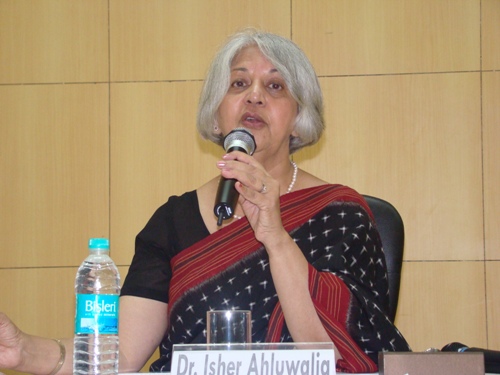24 Aug 2011|Noida | Amity Campus, Sector-125, Noida
“Proportionate Urbanization can help achieve desired GDP of 9% per annum” opines Dr. Isher Judge Ahluwalia- Vice Chairperson, Planning Board, Punjab during a lecture at Amity Law School
 Dr. Isher Judge Ahluwalia – a well known economist and Vice Chairperson, Planning Board, Punjab and Member, National Manufacturing Competitiveness Council, Government of India visited Amity Law School, Amity University, Sector-125, Noida and delivered an interesting and stimulating lecture on “Challenges of Urbanization in India”.
Dr. Isher Judge Ahluwalia – a well known economist and Vice Chairperson, Planning Board, Punjab and Member, National Manufacturing Competitiveness Council, Government of India visited Amity Law School, Amity University, Sector-125, Noida and delivered an interesting and stimulating lecture on “Challenges of Urbanization in India”.
Emphasizing on the role of urbanization and the role of Indian cities in the process of urbanization, Dr. Isher Judge Ahluwalia said that India is witnessing rapid urbanization, more and more people from rural India are moving to cities and predicted that
India’s urban population will reach over 600 million by 2031. She revealed that during the last decade India’s GDP has grown by approximately 8 % p.a unlike 1980’s when it grew by just 5%. In 12th Five Year Plan, the aspired GDP is 9%. Dr. Isher further shared that 2/3 rd of India’s GDP comes from non- agricultural sector and it is estimated that by 2031, 75% of India’s GDP will come from non- agricultural sector.
She remarked that the urban sector will play a critical role in the structural transformation of the Indian economy and in sustaining the high rates of economic growth in coming decades. At the same time Dr. Isher expressed her concern over the fact
that Indian cities are not ready to handle the overflowing deluge of population. Dr. Isher shared that 50% of China’s population, 75% of Mexico’s population and 80% of Brazil’s population live in urban areas whereas as per the latest consensus, only 30% of urban population live in urban areas. That 30% of urban population also face a dearth of infrastructural facilities. Therefore, there is an immediate need to upgrade urban infrastructural facilities.
Dr. Isher stressed that urbanization is possible only by
strengthening the framework of governance, synergizing urban and rural sector, addressing the needs of urban poor (which is 26% of the population living in cities) and increasing the investment in urban infrastructure deficit in terms of good roads, transport, proper sanitation, street lights, water management, solid waste management etc.
She averred that
India has to aspire for broad based and inclusive growth and even if the economic growth momentum is not accelerated, it has to be sustained at 8%.
Quoting the “Report on Indian Urban Infrastructure and Services” prepared by a High Powered Expert Committee (HPEC) under Dr. Isher Judge Ahluwalia, the eminent speaker said that for efficient urbanization, India’s Urban Local Bodies (ULBs) need to be strengthened as local self-government with clear functions, independent financial resources and autonomy to take decisions on investment and service delivery. State governments should provide an enabling environment for ULBs to discharge their enhanced responsibilities, they should set up State Finance Commissions (SFC), which will lay down the rules of funding to ULBs. Only then can they augment the urbaninfrastructure base, provide improved quality of services on a sustainable basis to their residents, and contribute to the growth momentum of the Indian economy.
Dr. Isher suggested that
an amendment is needed in the Constitution. Urbanization needs a great deal of governance rather than just investment. Government of India has to play a pro- active role, urbanization is just not State Government’s work. Government of India has to make an environment where State Governments can function efficiently and effectively. In view of the importance of urban infrastructure for economic growth and inclusion, the Government of India and state governments has to work in tandem.
The lecture was followed by an interesting question and answer session wherein the budding lawyers from Amity Law School, Amity University posed a volley of questions to the eminent speaker.